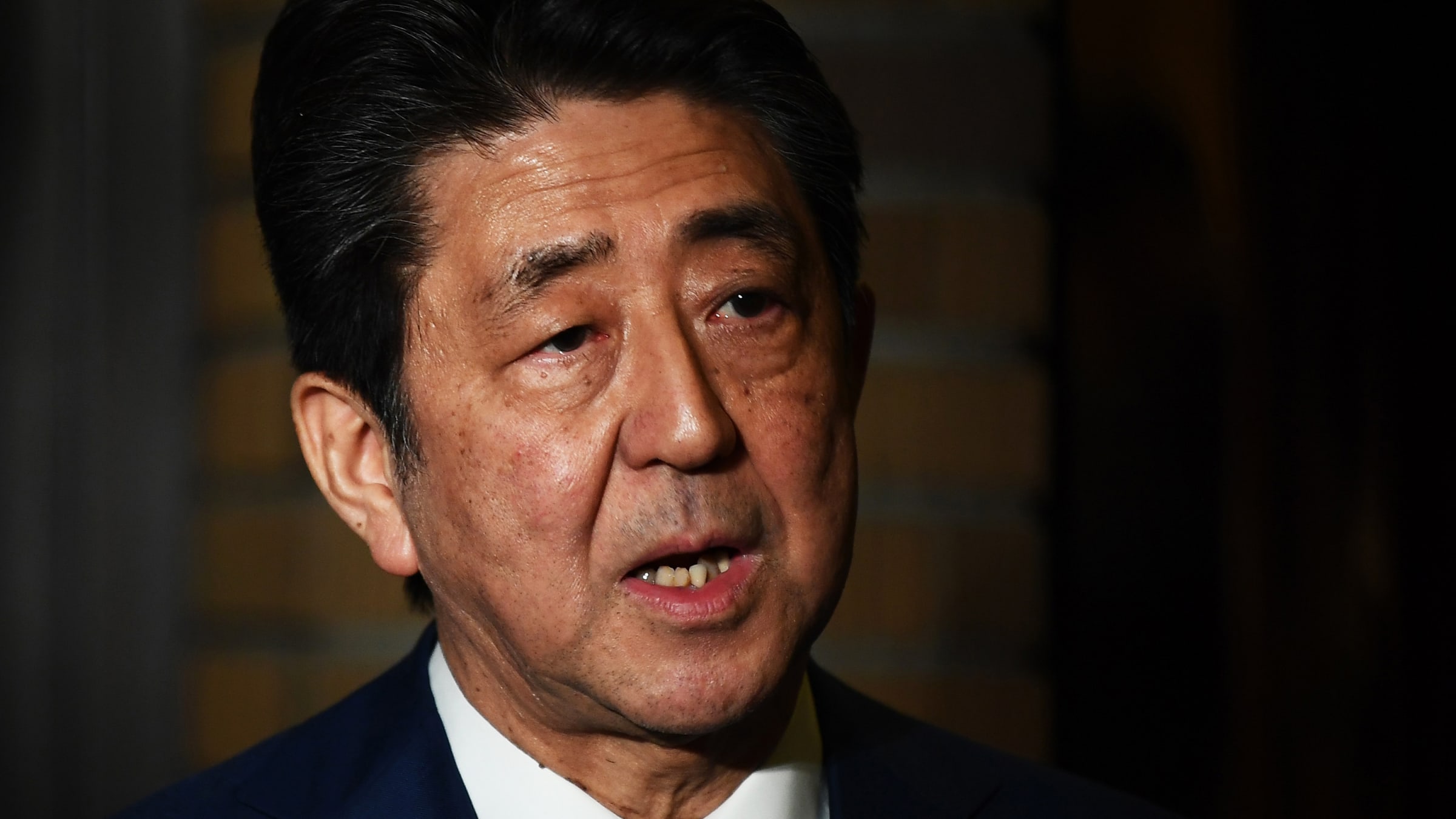Japan’s Ex-Prime Minister Is Behind This Hateful Olympic Scandal

CHARLY TRIBALLEAU/POOL/AFP via Getty Images
Sources involved in planning the Games told The Daily Beast that an Olympic ceremony fiasco was basically Shinzo Abe’s favor to his homophobic, ultranationalist pal and donor.
TOKYO—When the Olympics opening ceremony was held on July 23, ex-Prime Minister Shinzo Abe, the man who had sealed Japan’s bid for the Games in the first place, was conspicuously absent—but he was there in spirit.
Despite multiple warnings, the music of Abe’s long-time ally and donor—the homophobic, ultranationalist composer Koichi Sugiyama—was played in the opening athlete march. The decision was met with global outrage, but it wasn't just an unfortunate coincidence: it was something that Abe, as an honorary Olympic adviser, had personally requested, according to a Tokyo 2020 Organizing Committee employee who spoke to The Daily Beast.
“Sugiyama’s composition was the first among the 19 video game songs used, because Abe deemed it the most important. That’s what we were told,” the employee, speaking on condition of anonymity due to a non-disclosure agreement, told The Daily Beast.
Sugiyama—best known for creating the music for the popular “Dragon Quest” video game franchise—is notorious for all kinds of hateful political statements and positions, including siding with viciously homophobic politicians, denying a mass massacre that was carried out by the Japanese army, and falsely stating that no Korean women were used as sex slaves in Japan during World War II.
“Every stupid shit request was internally called a ‘something-something anken.’ You had the ‘IOC-anken,’ the ‘[Tokyo Governor Yuriko] Koike-anken,’ and, of course, the ‘Abe-anken,’” the employee said. When it was pointed out to the committee that Sugiyama’s toxic personal views might tarnish the event, Toshiro Muto, the Tokyo 2020 Olympics chief, allegedly told the employee: “This is Abe’s request. Do it.”
So, why would the former prime minister stick his neck out to have Sugiyama’s music featured in the Games?
As it turns out, 66-year-old Abe and 90-year-old Sugiyama are not only ideological allies who share the same controversial views, including blasting Japan’s pacifist, post-war constitution and denying that Japan has ever committed war crimes. And they’re not just friends who dine together in fancy French-Japanese fusion restaurants or sometimes get each other’s critics fired from their jobs.
The duo, it seems, have maintained a patron-client relationship that goes back several years. According to public records reviewed by The Daily Beast, Sugiyama has donated over $75,000 to Abe since 2011. Income and expenditure reports from Abe’s political funds management organizations show that the musician donated 1.5 million yen ($14,000) to Abe in 2016 alone. In a 2012 interview with FRIDAY magazine, the composer went into great detail about “pouring his private assets into supporting Abe.”
An employee from the monolithic advertising goliath Dentsu, the Olympics’ exclusive marketing partner, told The Daily Beast that he was also aware of the Abe-Sugiyama situation ahead of the Olympic ceremony.
“Of course, we knew that controversy was brewing. By late June, people had heard the ‘Dragon Quest’ music [composed by Sugiyama] playing during rehearsals, and one website wrote a very long piece on how problematic using Sugiyama was, saying it would shame Japan,” the staffer said. “It was all over the internet. A few newspapers sniffed it out and asked questions. We were all told to tell the press: ‘Oh that’s just practice music.’”
The Daily Beast also spoke to an individual who helped compile the opening ceremony press kit, who said that the songs were listed, but not the names of their composers. “The top brass didn’t want the media to start sniffing around and get put on the spot. So it was sort of a half-assed cover-up,” the source said.
The decision to use Sugiyama’s music sparked a slew of behind-the-scenes drama, insiders explained.
“Nintendo, cognizant that the event was a ticking time bomb, pulled out at the last minute. None of their songs were played. They decided that in no way did they want to be involved in the fiasco to come,” a Dentsu employee told The Daily Beast. “They probably regret that they ever let Abe [who is currently under investigation by the Tokyo Prosecutors for election law violations and other charges] appear as Mario. Not a good look now.”
Adding to that, Square Enix, the video game maker of “Dragon Quest,” had also publicly distanced themselves from Sugiyama in 2018, noting his views did not reflect company values. “As a matter of policy, we do not condone discrimination or harassment of any kind and we respect the diversity of sexuality and gender identity of everyone around the world,” the company said at the time.
Shinzo Abe did not respond to multiple requests for comment from The Daily Beast, and instead blocked the author of this article on Twitter. The Tokyo Olympic Organizing Committee did not respond to questions at the time of this writing, either.
The former prime minister has a reputation for avoiding the press, having spent 49 days without holding a single news conference last summer. He’s also the only prime minister in Japanese history to have been censured for “making false statements” 118 times by the parliament, for which he later apologized. The apology wasn’t quite enough for the Prosecutorial Review Board, which concluded last week that the Tokyo Prosecutors need to re-investigate Abe on charges pertaining to those lies.
When Tsunekazu Takeda, the former head of the Japan Olympic Committee, first asked Abe to become a top adviser in January of 2013, he gladly accepted. “Because my grandfather also took on the role of top adviser [for winning the bid for the 1964 Tokyo Olympics] and made it successful, I also wish to succeed,” Abe said at the time. The former prime minister had reportedly envisioned that a successful Olympics would give him enough popularity and political clout to change Japan’s constitution.
The “bitter experience” of planning the Games went beyond the Abe scandal, according to the Tokyo Organizing Committee employee who spoke to The Daily Beast. The staffer described the ordeal as “a never-ending series of changes and mishaps. Every time we’d have a decent storyline or plan, there would come a new request from the top brass to add this or add that or take this out.”
The employee explained that in 2017, the original team for the opening and closing ceremony was made up of eight people. However, the talented members resigned or were pushed out one by one. In December 2020, the Olympic Committee dismantled the eight-member team and put Hiroshi Sasaki, a former commercial director from Dentsu, in charge. Sasaki himself was forced to resign after the weekly magazine, Shukan Bunshun, reported that he had proposed staging a skit with plus-size TV personality Naomi Watanabe wearing pig ears, calling her “The Olympig.”
Despite the onslaught of scandals plaguing the Games, Professor Koichi Nakano, an expert on Japanese politics at Sophia University, isn’t surprised that Sugiyama’s music was featured in the opening ceremony. “Sugiyama holds extreme right-wing revisionist views and is a close supporter of Shinzo Abe. Abe clearly wanted to send a signal to his revisionist supporters that the Olympics were also a celebration of their views,” he told The Daily Beast.
Nakano also offered a theory on why Abe has kept such a low profile in recent weeks, not even tweeting congratulations to the many Japanese gold medal winners.
“Abe has the ambition to make another comeback as prime minister,” he said. “And he didn't want to be too closely associated with Tokyo 2020, which was turning into a major health hazard, as well as a PR disaster.”
—Chihiro Kai contributed to this story.
